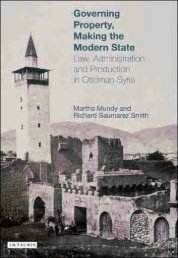The Young Turk Period, 1908-1918 - PSI424
The Young Turk Period, 1908-1918 - PSI424
The Young Turk Period, 1908-1918 - PSI424
You also want an ePaper? Increase the reach of your titles
YUMPU automatically turns print PDFs into web optimized ePapers that Google loves.
354 <strong>The</strong> Rise of Modern <strong>Turk</strong>ey, 1808-1975<br />
Party (<strong>Turk</strong> Halk Istirakiyun Firkasi), which had some connection with the Green<br />
Army. 56 This organization enabled the Communists to emerge to public view in<br />
<strong>Turk</strong>ey for the first time. In addition, on October 18, 1920, Kemal allowed the formation<br />
of a separate <strong>Turk</strong>ish Communist Party (<strong>Turk</strong> Komiinist Firkasi), but it<br />
was operated mainly by some of his close associates in the Assembly. 57 Far less<br />
active or radical than the first-named group, it was a government tool to divide<br />
and confuse the Communists and their supporters. Soon the former was active<br />
enough to cause its suppression. <strong>The</strong> last straw came when it issued a joint declaration<br />
with the Green Army and Cerkes Ethem that they had "approved the<br />
Bolshevik party program passed by the Third International . . . and joined to<br />
unite all the social revolutionary movements in the country," and adopted the name<br />
<strong>Turk</strong>ish People's Collectivist Bolshevik Party. 58 Communist agents became active<br />
around Ankara and Eski§ehir and cooperated with Unionist groups in Erzurum<br />
and Trabzon, which were centers of Enver's supporters throughout the War for<br />
Independence. 59 This stimulated Kemal to criticize the Communists for working<br />
outside the organ of the people, the Grand National Assembly. After £erkes Ethem<br />
was crushed and the Green Army broken up, he suppressed the Communists and<br />
brought their leaders to trial, though the final judgments were suspended until<br />
after the Treaty with Moscow was signed in March 1921, and the sentences were<br />
relatively light compared to some. <strong>The</strong> only violent action against the <strong>Turk</strong>ish<br />
Communists came when Mustafa Suphi and a few friends entered Anatolia via<br />
Kars on December 28, 1920. Though they met with Ali Fuat Cebesoy and Kazim<br />
Karabekir at Kars early in January 1921, they were arrested soon after. As they<br />
were being sent by boat to Erzurum for trial, they were assassinated by a group<br />
of pro-Enver supporters from Trabzon, apparently because of their fear that Suphi<br />
might bring discredit to Enver's efforts. 60<br />
What, indeed, had happened to Enver and his supporters? Enver, Cemal, Talat,<br />
and a few friends had fled from Istanbul the night of November 2, <strong>1918</strong>, on a<br />
German freighter going to Odessa. From there they had gone on to Berlin, where<br />
they lived under assumed names, since the Entente victors were demanding their<br />
extradition for the "crimes" of their regime. Soon they were invited by Karl Radek<br />
to continue their work in Moscow, with full Bolshevik support for the "<strong>Turk</strong>ish<br />
national struggle." Talat remained in Germany, where he was killed by an Armenian<br />
assassin on March 15, 1921. Cemal and Enver went to Moscow, and later<br />
to Central Asia, where they undertook a series of political activities with the ultimate<br />
intention of using the Bolsheviks to regain power in <strong>Turk</strong>ey once the nationalists<br />
were defeated. With Bolshevik encouragement Enver proclaimed the<br />
organization of the Union of Islamic Revolutionary Societies (Islam Ihtildl<br />
Cemiyetleri Ittihadi) and an affiliated Party of People's Councils (Halk §uralar<br />
Ftrkast)t the former as the international Muslim revolutionary organization, the<br />
latter as its <strong>Turk</strong>ish branch. On September 1-9, 1920, he attended the Congress of<br />
the Peoples of the East at Baku, meeting a Kemalist delegate who was present.<br />
But while Kemal generally encouraged Enver's work in the hope of using him<br />
to get Bolshevik aid, he never actually committed himself to anything. Enver had<br />
a small group of supporters in Anatolia, mainly at Trabzon, and about 40 secret<br />
Unionists in the Grand National Assembly were working to install Enver in place<br />
of Kemal at the right time. Enver moved from Moscow to Batum in the summer<br />
of 1921 just as the Greek offensive began, so that he could enter Anatolia quickly<br />
if Kemal was defeated. But following Kemal's victory over the Greeks at the<br />
Sakarya (September 1921), Enver abandoned his plans for <strong>Turk</strong>ey and went into












